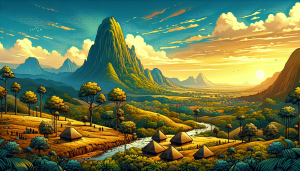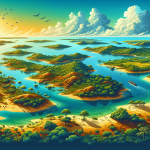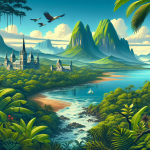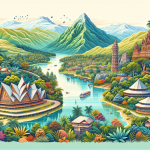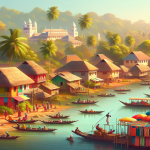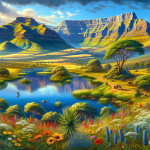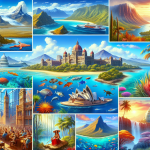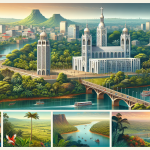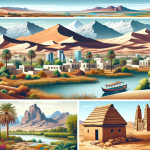Discovering Guinea: A Hidden Gem in West Africa
Guinea, a country often overlooked by travelers, offers a treasure trove of natural wonders, vibrant cultures, and historical landmarks. Nestled in West Africa, Guinea is bordered by Guinea-Bissau, Senegal, Mali, Côte d’Ivoire, Liberia, and Sierra Leone, making it a key player in the region. Despite its rich heritage and scenic landscapes, Guinea remains one of the least visited countries in Africa, providing an unspoiled and authentic travel experience. This guide will introduce you to Guinea’s captivating attractions, from its bustling capital Conakry to the serene Fouta Djallon highlands. We’ll delve into the must-see destinations, the best times to visit, and practical tips for travelers looking to explore this hidden gem. Whether you’re an adventure seeker, a history buff, or simply looking for an off-the-beaten-path destination, Guinea has something unique to offer.
Exploring Conakry: The Heartbeat of Guinea
Conakry, the capital city of Guinea, is the country’s economic, cultural, and political hub. Situated on the Atlantic coast, Conakry is both a bustling metropolis and a gateway to Guinea’s diverse attractions.
Landmarks and Cultural Spots
The National Museum of Guinea offers a glimpse into the country’s rich history and cultural heritage. Exhibits include traditional masks, musical instruments, and artifacts from various ethnic groups. It’s an excellent starting point for understanding the cultural diversity of Guinea.
The Conakry Grand Mosque, one of the largest in West Africa, stands as a symbol of the country’s Islamic heritage. Visitors can admire its impressive architecture and serene ambiance.
The Palais du Peuple is a cultural venue where you can catch performances of traditional Guinean music and dance. The venue also hosts various festivals and cultural events throughout the year.
Markets and Local Cuisine
Madina Market is Conakry’s largest market, where you can immerse yourself in the vibrant daily life of the city. From fresh produce to handcrafted goods, the market offers an array of items that reflect Guinea’s rich culture.
Local Cuisine: Don’t miss trying traditional Guinean dishes such as Poulet Yassa (chicken marinated with onions and lemon), Fufu (a dough-like food made from cassava or yams), and Jollof Rice. Conakry’s restaurants and street vendors serve up flavorful meals that are a testament to the country’s culinary prowess.
The Natural Wonders of Fouta Djallon
The Fouta Djallon highlands, located in central Guinea, are known for their breathtaking landscapes, waterfalls, and hiking trails. This region is a haven for nature lovers and adventure enthusiasts.
Hiking and Outdoor Activities
The Mount Loura hike offers panoramic views of the surrounding highlands and is a favorite among trekking enthusiasts. The trails are well-marked and accessible to hikers of various skill levels.
Chutes de Kambadaga is a series of stunning waterfalls that provide a refreshing escape from the tropical heat. The falls are surrounded by lush vegetation, making it a perfect spot for picnicking and relaxation.
Cultural Immersion
The Fulani People, who inhabit the Fouta Djallon region, are known for their rich traditions and hospitality. Visitors can engage with local communities, participate in traditional ceremonies, and learn about the Fulani way of life.
Local Markets in towns like Labé offer a chance to purchase traditional crafts, textiles, and souvenirs. The markets are also a great place to sample local foods and interact with the friendly residents.
Historical Sites and Heritage
Guinea boasts several historical sites that reflect its colonial past and cultural evolution. Exploring these landmarks provides insight into the country’s complex history and resilience.
The Island of Rooma
Located off the coast of Conakry, Rooma Island is part of the Loos Islands and is steeped in history. It was once a center for the British slave trade in the 18th century. Today, visitors can explore the remnants of colonial buildings and learn about the island’s dark past through guided tours.
The Town of Dubréka
Dubréka is known for its French colonial architecture and historical significance. The town’s old buildings and cobblestone streets offer a glimpse into Guinea’s colonial era. It’s a quiet town ideal for a day trip from Conakry.
Practical Travel Tips
Traveling to Guinea requires some preparation to ensure a smooth and enjoyable trip. Here are some practical tips for travelers:
- Visa Requirements: Most travelers need a visa to enter Guinea. It’s advisable to check with the nearest Guinean embassy or consulate for the latest visa requirements and application procedures.
- Health Precautions: Guinea is a tropical country, so vaccinations for diseases like yellow fever, typhoid, and hepatitis A and B are recommended. Malaria prophylaxis is also advised.
- Currency: The official currency is the Guinean franc (GNF). It’s essential to carry enough cash, as ATMs are not widely available outside of major cities.
- Language: French is the official language, but several indigenous languages are also spoken. Learning a few basic French phrases can be helpful.
- Transportation: Public transportation options include taxis and minibuses. For longer distances, domestic flights and rental cars are available.
Sustainable Travel in Guinea
Promoting sustainable travel practices is crucial for preserving Guinea’s natural and cultural heritage. Here are some ways to travel responsibly:
- Support Local Businesses: By purchasing goods from local markets and staying in locally-owned accommodations, you contribute to the local economy.
- Respect Cultural Norms: Understanding and respecting local customs and traditions is essential. Dress modestly, ask for permission before taking photos, and be mindful of cultural sensitivities.
- Conserve Natural Resources: When visiting natural sites, follow guidelines to minimize your environmental impact. Stick to marked trails, avoid littering, and conserve water and energy.
Conclusion
Guinea offers a unique and enriching travel experience that caters to a wide range of interests. From the vibrant streets of Conakry to the serene landscapes of Fouta Djallon, the country is brimming with opportunities for exploration and adventure. Despite its challenges, Guinea’s warm-hearted people, rich cultural tapestry, and stunning natural beauty make it a destination worth discovering. As more travelers seek authentic and off-the-beaten-path experiences, Guinea stands out as a hidden gem waiting to be explored. So pack your bags, embrace the spirit of adventure, and set out on a journey to uncover the wonders of Guinea.
For more detailed information on planning your trip to Guinea, visit the Guinea Tourism Official Site.
Additional Travel Tips and Considerations
While Guinea is a rewarding destination, travelers should be mindful of certain considerations to ensure a safe and enjoyable trip. Here are some additional tips:
- Travel Insurance: It’s advisable to have comprehensive travel insurance that covers medical emergencies, trip cancellations, and lost luggage.
- Local Etiquette: Guinea is a predominantly Muslim country, and it’s important to respect local customs, especially regarding dress codes and behavior in public places.
- Safety: While Guinea is generally safe for tourists, it’s wise to stay informed about local news and travel advisories. Avoid traveling alone at night and keep your belongings secure.
- Connectivity: Internet access may be limited in rural areas. Consider purchasing a local SIM card for better connectivity.
- Travel Guidebooks: Bringing a travel guidebook can be helpful for navigating and understanding the local culture and attractions.
Future Prospects of Tourism in Guinea
As Guinea continues to develop its tourism infrastructure, there are exciting prospects for the future of travel in the country. Ongoing efforts to improve transportation, accommodation, and visitor services are poised to attract more tourists.
Eco-Tourism Initiatives
Guinea has the potential to become a leading eco-tourism destination in West Africa. With its diverse ecosystems, including rainforests, savannas, and coastal regions, the country offers numerous opportunities for eco-friendly travel experiences. Conservation projects and sustainable tourism initiatives are being developed to protect Guinea’s natural heritage.
Cultural Festivals
Promoting cultural festivals and events can enhance Guinea’s appeal as a travel destination. Celebrations such as the Fête de l’Indépendance (Independence Day) and various traditional festivals showcase the country’s vibrant culture and attract visitors from around the world.
Final Thoughts
Guinea is a country of contrasts, where modernity meets tradition and natural beauty abounds. Its relatively untouched landscapes and rich cultural heritage make it a compelling destination for adventurous travelers. By embracing sustainable travel practices and respecting local customs, visitors can contribute to the preservation of Guinea’s unique charm.
Whether you’re drawn to the bustling markets of Conakry, the tranquil highlands of Fouta Djallon, or the historical sites that tell the story of Guinea’s past, your journey through this West African nation promises to be unforgettable. So take the road less traveled, explore the hidden gem that is Guinea, and create memories that will last a lifetime.
